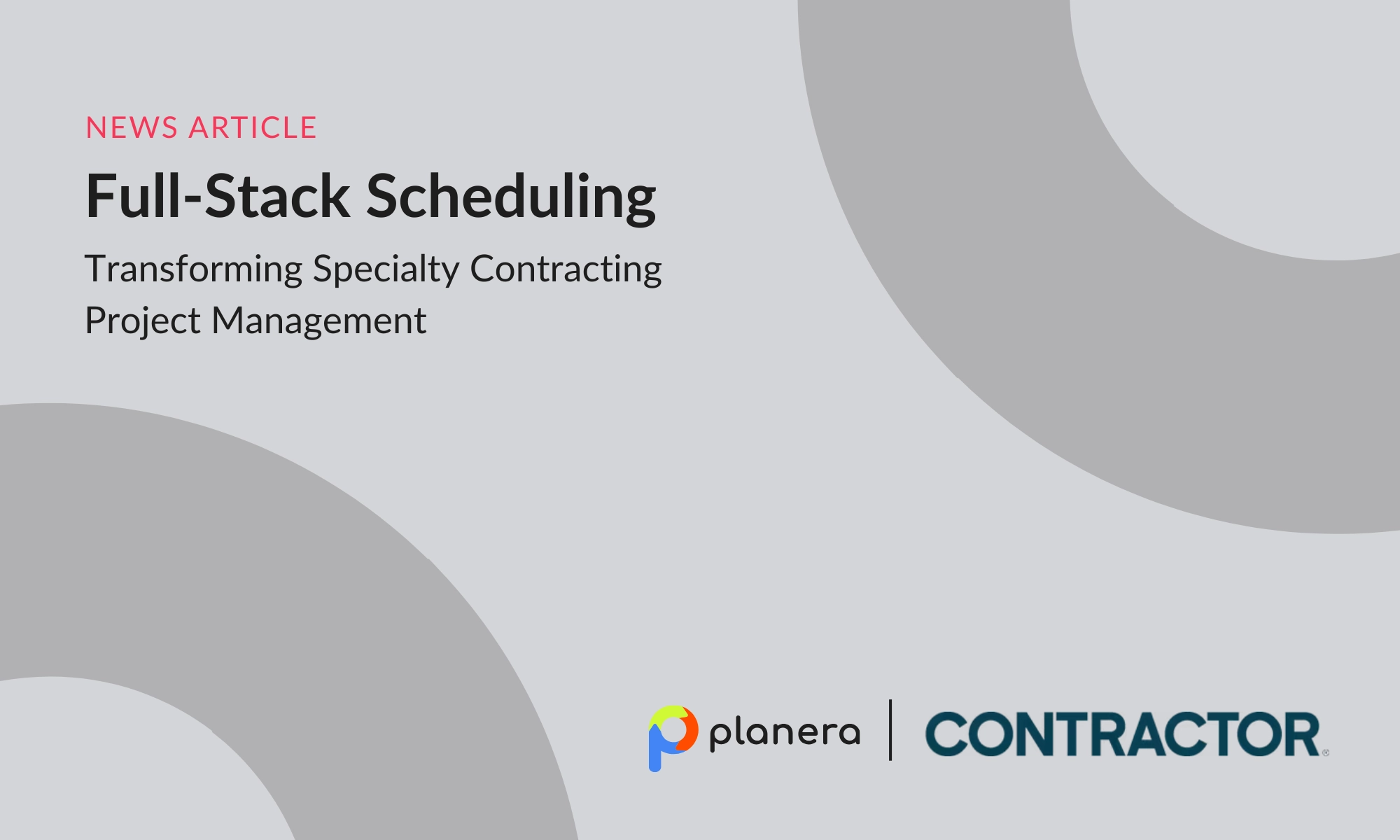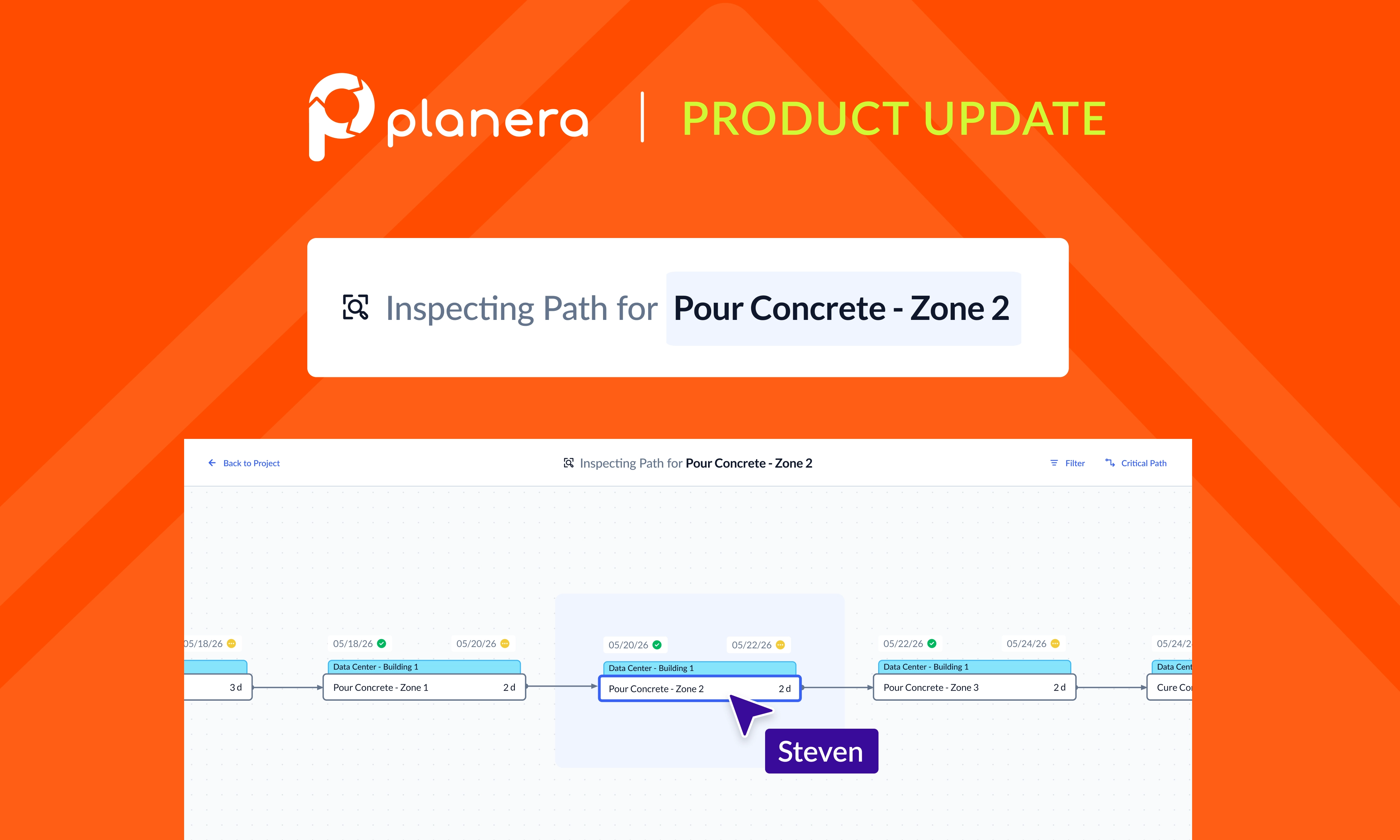Why Specialty Contractors Are Embracing Full-Stack Scheduling
In today’s complex construction environment, mechanical, electrical, and plumbing contractors face increasing pressure to deliver high-quality work on tight timelines—often within shared spaces and across overlapping scopes. Traditional scheduling tools aren't built for their unique needs.
This article explores full-stack scheduling, a new approach that bridges the gap between master schedules and field-level coordination. Learn how this method empowers specialty contractors to optimize system sequencing, streamline prefabrication, and better coordinate with other trades—leading to more profitable and predictable project outcomes.
Discover how platforms like Planera are helping MEP contractors turn scheduling into a competitive advantage.
In today's increasingly complex construction landscape, specialty contractors face unique scheduling challenges that traditional project management tools struggle to address. A revolutionary approach called "full-stack scheduling" is changing how trade contractors plan, coordinate, and execute their sophisticated projects across the mechanical, electrical, and plumbing sectors.
The Scheduling Disconnect
Trade contractors have long experienced a frustrating disconnect in project scheduling methodologies. Master schedules created in platforms like Primavera P6 or Microsoft Project offer the big picture but often fail to accommodate the intricate sequencing requirements of specialized installations. Meanwhile, various field-focused tools have emerged to handle day-to-day coordination, but these rarely sync effectively with the overall project timeline.
This division has created significant challenges for specialty contractors:
- Critical path dependencies that affect multiple building systems
- Complex material delivery sequencing requirements
- Specialized labor allocation across multiple project phases
- Coordination with other trades in shared spaces
- Balancing prefabrication with field installation workflows
For specialty contractors, this scheduling gap isn't just inconvenient—it directly impacts profitability, project timelines, and team coordination.
What Makes Full-Stack Scheduling Different?
Full-stack scheduling represents a unified approach that connects every level of planning for specialty construction projects. It creates a seamless bridge between master construction schedules and the detailed installation sequencing crucial for specialized system success.
Unlike traditional scheduling methods, full-stack scheduling acknowledges the unique workflow of trade contractors, where installation tasks must follow precise sequences while remaining flexible enough to adapt to inevitable project changes. This approach ensures that every component installation, connection, and system test is properly sequenced while maintaining alignment with the broader project milestones. Plumbing and hydronic heating contractors, in particular, benefit from this system as it streamlines the coordination of intricate installations, ensuring efficient delivery and reducing costly delays.
Advantages for Specialty Contractors
Trade contractors implementing full-stack scheduling solutions gain several competitive advantages:
Streamlined System Sequencing: Properly sequence technical installations and operations within the context of other building systems and overall project timelines.
Enhanced Prefabrication Opportunities: Better coordinate shop fabrication schedules with field installation needs, maximizing the efficiency benefits of prefabricated assemblies.
Optimized Crew Deployment: Allocate specialized technical staff across multiple project phases with greater precision.
Improved Material Management: Coordinate deliveries of specialized components and materials to arrive exactly when needed for installation.
Better Cross-Trade Coordination: Communicate more effectively with other trades to prevent conflicts and sequencing issues in shared spaces.
Limitations of Conventional Tools
While traditional scheduling platforms have served the construction industry for decades, they present particular challenges for specialty contractors:
Technical Barriers: Complex interfaces limit accessibility for field supervisors and specialized teams.
System Complexities: Standard scheduling tools lack features to properly map the intricate dependencies between specialized components and other building systems.
Limited Field Utility: Project schedules rarely translate effectively to daily installation tasks for specialized trades.
Communication Challenges: Difficult to share critical sequencing information with other trades, leading to coordination conflicts.
Next-Gen Solutions for Trade Specialties
Forward-thinking companies are now developing solutions specifically designed to address the scheduling challenges faced by specialty contractors.
Planera's platform, for example, provides a visual, collaborative scheduling environment particularly well-suited for the complexities of specialized trade work. The system makes sophisticated scheduling accessible to everyone from project managers to field supervisors, ensuring that critical dependencies are visible and understood by all stakeholders.
The Future of Specialty Project Scheduling
As building systems grow increasingly complex, with advanced controls, energy-efficient components, and intricate integration requirements, the need for sophisticated yet accessible scheduling tools will only increase. The specialty contractors who embrace full-stack scheduling will gain significant advantages in:
- Winning more complex projects through demonstrated coordination capabilities
- Completing sophisticated installations with fewer delays and conflicts
- Maximizing prefabrication opportunities to control labor costs
- Building stronger relationships with general contractors through better communication
In an industry where profit margins depend on efficient execution, specialty contractors can no longer afford disconnected scheduling approaches. The full-stack scheduling model provides a competitive edge by ensuring that every component installation and system test happens in the right sequence, at the right time, coordinated with all other building activities.
As the construction industry continues evolving toward more integrated and efficient practices, platforms like Planera are leading the way—making sophisticated scheduling accessible, collaborative, and specifically attuned to the unique needs of specialty contractors across the mechanical, electrical, and plumbing trades.
Nitin Bhandari is the co-founder and CEO of Planera, where he is democratizing construction CPM (Critical Path Method) scheduling with a collaborative, visual software solution. By reimagining project planning and management, Planera drives team engagement, fosters alignment, and secures buy-in at all levels, making complex scheduling more intuitive and efficient.
This article originally appeared in Contractor Magazine.




